Whiplash: Press conference with Damien Chazelle, JK Simmons and Miles Teller
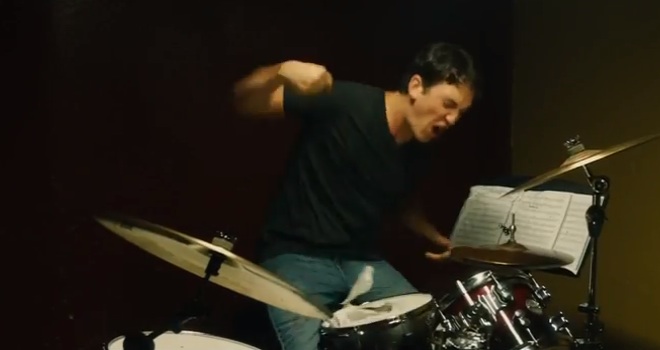
Promoting the release of Whiplash, director Damien Chazelle and lead actors J.K Simmons and Miles Teller caught up with The Upcoming about jazz and how Simmons got to be so scary.
J.K Simmons injects fear quite brilliantly. Fletcher – what a character! What do you think drives him?
J.K. Simmons: Passion for the music, utter perfectionism, and complete single-mindedness of the pursuit of that goal, human collateral damage notwithstanding.
In terms of preparing for the role, what did that involve for you?
JKS: Honestly the preparation that I had to do for the role was just learning the music. As far as playing the character, it was all there on the page and I didn’t feel the need to look outside of what Damien [Chazelle, writer and director] had written, and just hit the deck running with this guy [points at his co-star].
And Miles, you were a drummer from the age of 15 as well, which stood you in good stead, but you had to learn a whole other discipline here.
MT: Yeah I played drums since I was 15; me and my older sisters, we all played instruments. I started with piano and then I played saxophone in jazz band in high school, up until sophomore year. But with drumming, I drummed in some rock bands, I just asked for a drum kit when I was 15 and my parents were kind enough to buy me one, and I just started playing with my buddies who played guitar and covered, like, Green Day. And I’ve always taken my drum kit with me, but I’d never taken any kind of lessons for it. It was great when I first started to get these lessons – it was one of those things where it’s like “Oh yeah, that is so much easier to do it that way, I’ve been doing it wrong”, and so I just started taking jazz lessons four hours a day, three days a week with Damien at first, and then the kid who plays Carl in the film (Nate Lang). He’s a very good drummer and he was kind enough to be my teacher, just teaching me the traditional jazz playing, how to hold the sticks. It was very basic at first – really, like: “This is how you hold a stick, this is how you hit a snare drum”.
With the practice scenes where Damien wouldn’t shout cut, would he keep you going until you reached the point of exhaustion?
MT: Well I guess that’s a question for Damien.
Damien Chazelle: It makes me sound so tyrannical. I think that’s just one scene that Miles likes to give me grief for. It is true though that we shot the movie so quickly, when you look at Miles on-screen he’s not acting exhausted, there’s real exhaustion that maybe was the one weird benefit of having such a tight, unrealistic schedule.
JKS: Time to get this out there – 19 days for the whole shoot.
Wow, did that help? Do you think it added something to the intensity of the film?
DC: I think the only way that it maybe helped was with that emotionality. That said, I think that we can always use more time, and certainly Miles and J.K. are both good enough actors that they don’t need to not sleep to act sleepy.
MT: Future directors out there, that’s not true.
J.K., when Jason Reitman was here last week he said that he wished he’d been the one to direct you though this performance. Could you speak about the remarkable run of roles you’ve had in the last few years?
JKS: It’s been great, and Jason expressed that to me early on, loving what Damien had written and loving the work that Damien was doing. And Jason of course was a producer on the film. Being involved to one degree or another in every film Jason has done from the beginning has been a really fun and gratifying part of my career, and the fact that this script came to me from him was my first clue that it was going to be something that had a chance to be extraordinary.
You’ve touched previously upon improvisation being at the heart of jazz. Does the spirit of that translate on-set, and were you able to be more instinctive with your performances?
JKS: Well I don’t have a response written for that.
DC: Actors are monkeys. That’s a quote, just giving you gold. But the first things that I had done in school were actually documentaries and then sort of semi-documentaries and shooting of jazz musicians. This was the first time I had done something as carefully written out and storyboarded. With that said, my philosophy is still if you’re literally going to transpose the script and storyboards, you might as well just publish the script and storyboards, not have the pain of working with actors.
I wouldn’t say it was a completely improvisatory set, partly because there wasn’t time for that, but when you have people as good as Miles and J.K., you want to let them riff. Certainly some of my favourite little moments in the movie, whether it’s little lines or even just looks, are J.K. and Miles. An example I just remembered is one of the first times we see J.K come into the band room, he opens up the folder and does this little look at the music that I guess is not up to his standard and says 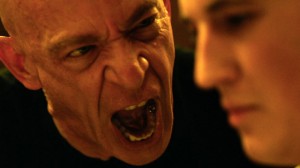 “Cute”. I didn’t write that, and it’s an example of something that says pages and pages about the character. I could have written five pages of dialogue to equal that and it wouldn’t have been as good.
“Cute”. I didn’t write that, and it’s an example of something that says pages and pages about the character. I could have written five pages of dialogue to equal that and it wouldn’t have been as good.
JKS: It was cool to have something so thorough on the page but also to have the freedom to play within that framework and that is part of what’s fun about what we do. Often in a movie you’ll have one or the other. You’ll have a really good, solid script, or you’ll have a sort of “Hey we put this down, but just do what you want” kind of thing, but this was a nice combination.
Have either of you ever had a mentor who meant as much to you as these characters do to each other?
DC: The relationship that I had with my band leader was certainly the main inspiration for the character Fletcher. It made me a better drummer, although I’m not a drummer now so I can’t say it made me a great artist as a drummer, but in terms of just sheer work ethic, it made me think about how the extent to which fear can be a motivator, and whether that is a good or a bad thing. We assume that it works sometimes, and sometimes it does, but sometimes it just discourages people. But the times it does and it those few cases, is it actually worth it?
JKS: Most mentors that I think back on were much kinder and gentler. The people who, in my experience, used fear as motivation, well I just don’t respond well to that.
MT: I kind of echo J.K. in terms of what I respond to. I had a piano teacher when I was young who was pretty tough on me but I didn’t have the passion for piano, so I just quit taking lessons from her. The closest thing I had to Fletcher was a driver’s ed. teacher I had. The guy used to get so pissed off when you couldn’t parallel park, and would slam stuff and strike fear in his students. It was just such a bizarre displacement of that kind of energy. But I never had it in acting.
The movie itself is quite reminiscent of boxing films – has this been an inspiration for you while filming? Was Whiplash in any way a parallel of that genre?
DC: Yeah, absolutely. It started with just the idea of showing the physicality of music playing. Especially in today’s day and age of a lot of electronic music a lot of music that’s not made physically per se, the idea of physical musicianship and what that does to the body is interesting and under-appreciated. The way that trumpeters screw up their lips and pianists screw up their fingers and drummers screw up their hands: that for me brings to mind the world of sports. I guess I wanted to draw on some of those parallels again, also because I think there are lots of music movies about the more intellectual or emotional sides of the art form, which obviously are just as crucial, but I don’t think need to be spotlighted as much. I think there’s more need today to spotlight the sheer, raw hard work that goes into getting to that level, and what that does to your body. I just remember my hands bleeding a lot, so a lot of the imagery just came from my own personal experiences and also the rage you feel sometimes as a musician just trying to get something right. In a way it mirrors Fletcher’s rage at his musicians. Andrew gets just as mad as Fletcher ever does at himself when he’s not getting something properly, and that’s the sort of feeling that a lot of musicians can share, like butting your head against a wall when you can’t do what you’ve set out to do. There is a kind of anger and a kind of physicality that comes from it that to me isn’t far from the stuff you see in Raging Bull.
MT: Damien actually gave me a copy of Raging Bull to watch as a kind of preparation for this.
Can you tell us a bit about the logistics of doing the final scene? How long did it take, and how much of the drum solo did you make up as you went along?
MT: It’s all kind of blurred because we did film it in 19 days. I think we spent two days on that last performance. One day we did like 140 set ups. But Damien would tell me to play a ten-minute drum solo, but I also had the music for a drum solo before we started, and it was something I was listening to and there were parts of it, as with Whiplash and Caravan, that I tried to learn by heart. But for a lot you just plan a ten-minute drum solo and people have to listen to it. And that’s great because I played drums in my house and my parents never really told me to quiet down, and nobody wants to hear a ten-minute drum solo. But this is the climax of the movie!
And was it real blood?
MT.: Not mine.
J.K., how did you go about making yourself so terrifying, and did you stay in character in between takes?
JKS: I terrorised the entire crew. No, we quickly fell into a rhythm of just having fun goofing around on the set between takes. Damien would yell cut and this kid would reassert his masculinity, which I had stripped him of. Or he would attempt to. As far as creating the character, I felt like I was just channeling what Damien wrote. There was no conscious effort on my part to achieve anything other than bringing his work off the page.
Damien, this being a semi-autobiographical film, were there elements of biopic films that you tried to avoid or stick to?
DC: One thing that certainly a lot of biopics do that, by definition, I was interested in is sort of like an origins story, the idea of seeing how someone becomes someone. That, to me, is really interesting because there is the really big question mark of where do these “great artists” come from? The Charlie Parker story is referenced a lot in the movie, which Fletcher twists and uses to justify his methods. But there’s also this question that underlined it, which is that we don’t really know how Charlie Parker went from being an undistinguished saxophone player in his teens, who no one at the time thought would go anywhere special, to someone who, by the time he was 19, was being hailed as the greatest musician on the planet. It was just this immediate sort of thing, and it poses all these kinds of questions, and it almost seems like a Faust story.
The one thing that I am grateful for is that a movie about a jazz drummer can connect to people who maybe aren’t in that world. That is in a large part thanks to these two guys (Teller and Simmons) – they humanise it and they also universalise it in a way that wasn’t apparent on the day.
Has this movie provided you with the answers to how far you would ever push yourself, or let others push you?
JKS: Well that’s part of the whole central debate, that theme, and I think that you don’t achieve greatness without pushing, whether it’s you pushing yourself or pushing others. Again, having said that, the methodologies are possibly questionable.
J.K and Miles, what inspires you both as actors?
JKS: I’ve never really thought of consciously being inspired by other actors. There are certainly many, many actors that I 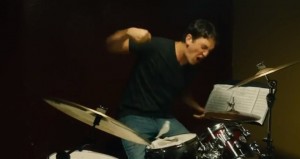 greatly admire. Anthony Hopkins in the Elephant Man, and for whatever reason, Willam Defoe in Platoon jumped into my head. But this really goes back to the beginning of my music days, when I was studying music in college it was about Brahms or Schubert, or whoever I was singing; I sort of felt like a conduit to a great creative artists, whether they’re composers or whether its Shakespeare or Chazelle. It’s the creator that inspires me.
greatly admire. Anthony Hopkins in the Elephant Man, and for whatever reason, Willam Defoe in Platoon jumped into my head. But this really goes back to the beginning of my music days, when I was studying music in college it was about Brahms or Schubert, or whoever I was singing; I sort of felt like a conduit to a great creative artists, whether they’re composers or whether its Shakespeare or Chazelle. It’s the creator that inspires me.
MT: I don’t know when it clicked into something different than just getting on stage in high school and making people laugh. But I think there was something for me when I started taking classes in New York and I’d go to the Lee Strasberg institute, and you walk in and you see black and white photos of Pacino, and De Niro and Brando and Hoffman at the same school, and I think that’s what inspired me. I just love the history of that and I think it is such a beautiful craft. It is something that you absolutely get out what you put into it. So I guess what I’m inspired by is trying to be a part of something that I have such a great respect for.
Was there any point on-set where someone exceeded your expectations?
MT.: When I saw the movie, it exceeded my expectations. It’s very rare in my experience that the movie is better than the script, usually the script is so good and you hope to make a version of it that kind of gives you that feeling you get when you first read it. When I saw this film for the first time I was blown away by what Damien had done with it. As an actor, for the final product you really have little to do with it. At the end of the day, you film for a couple of weeks and then people mess with it for, like, a year, or in Damien’s case, two months, and they put it together. The way Damien shows it with the tension and suspense – as an actor you can’t act suspense, you don’t act tension, that’s all done in the edit, so I was truly blown away by Damien’s talent, and that’s why I’m doing his next film.
Finally, the quote “No two words in the English language are more dangerous than ‘good job’” – did someone say that to you?
DC: Me? No that’s from own sick mind. I do remember when I grew up, partly in France, they would joke to me about how, in their mind, they’re vision of America was people saying “good job” all the time. I guess what’s interesting to me about that scene is that there are many ways to take that Charlie Parker myth. Some people point out that most versions of that myth don’t even involve the cymbal actually being thrown at his head –
MT: I wish my character knew that.
DC: When Fletcher twists this myth around to justify his own behaviour, and the fact that he pulls from it this lesson that you should never say “good job”, it’s not a lesson that I necessarily agree with, but at the same time, as with any character you write, you want to be able to see their point of view. As screwed-up as Fletcher’s mindset is, the one thing that you think makes him somewhat noble is that in a world of hypocrites, he has a coherent worldview. It might be a perverted and despicable one, but it’s one that he will go to his grave defending. At least there’s something to be said for that sort of blind passion.
Aidan Milan
Whiplash is released nationwide on 16th January 2015.
For further information about the BFI London Film Festival visit here.
Read more reviews from the festival here.
Watch the trailer for Whiplash here:





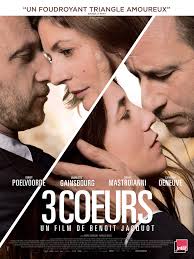
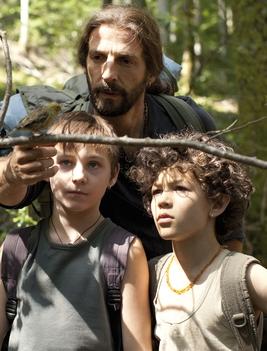
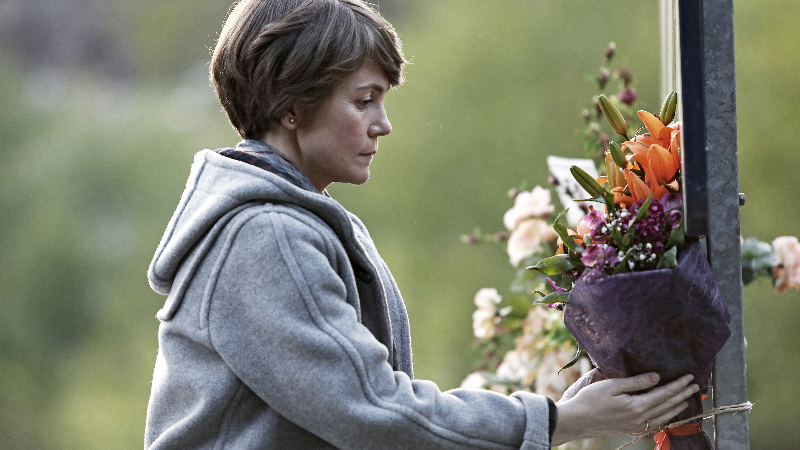
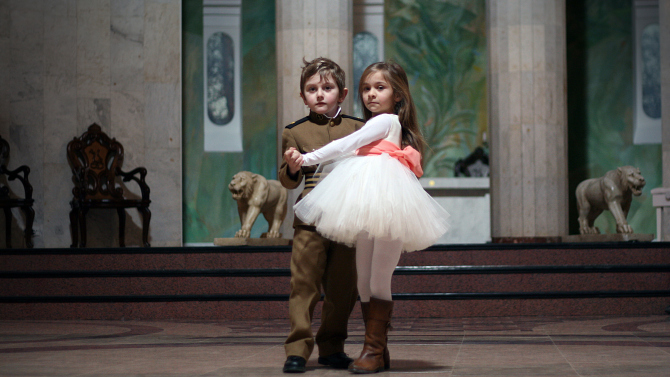
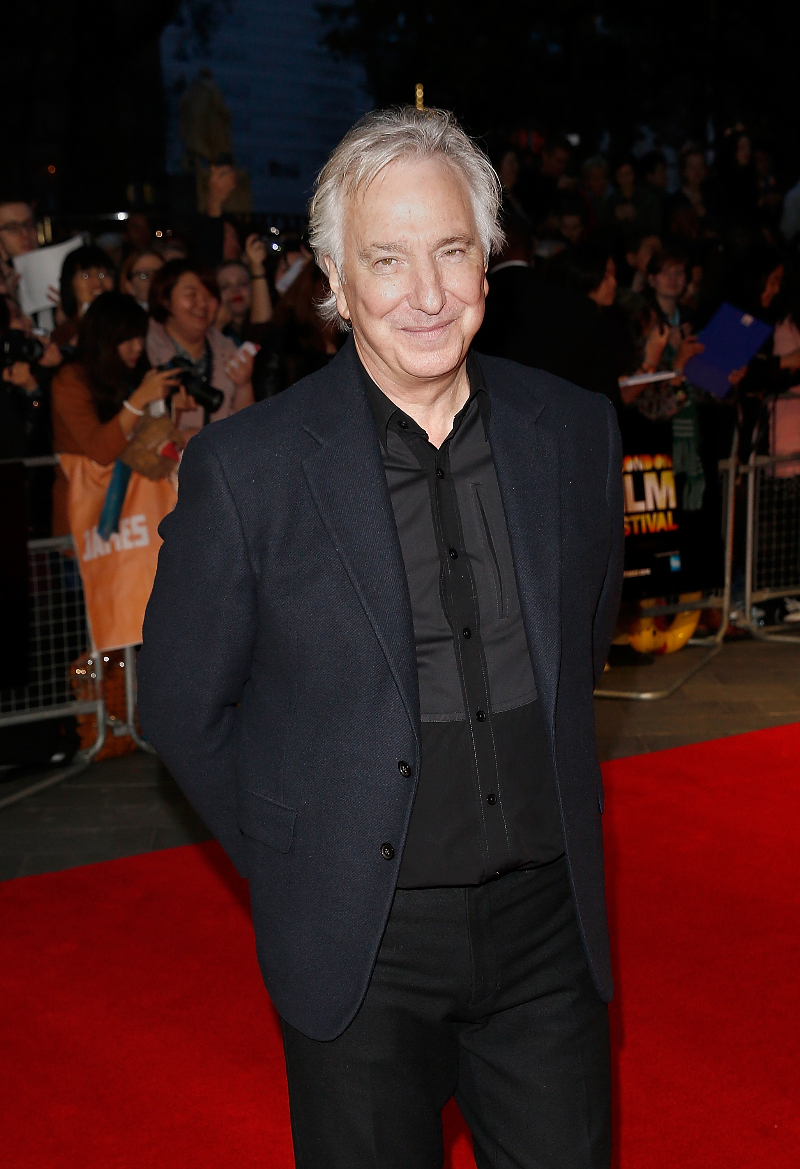









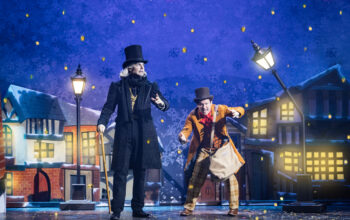





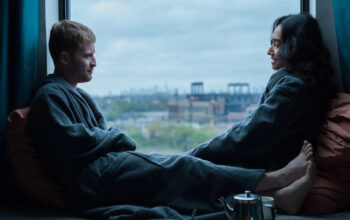
Facebook
Twitter
Instagram
YouTube
RSS